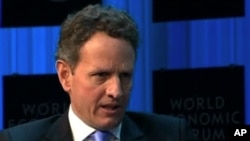“Three years ago, President [Barack] Obama laid out a broad strategy for rebuilding the American economy,” U.S. Secretary of the Treasury Timothy Geithner said at the Commonwealth Club in San Francisco. “He recognized . . . that we live in a global economy, and this global economy will be a potential source of economic growth . . . but also a source of challenges.”
To build a stronger foundation for growth, the United States could not continue to borrow from the rest of the world to finance an economy driven by consumption and housing. Future growth would have to come more from investment and exports.
“Parts of the world, and particularly emerging markets, have been a source of strength for the United States . . . China has been a significant part of this growth,” Secretary Geithner said. “Overall, American exports have increased about 34 percent since 2009. [But] no other country presents China’s particular mix of opportunities and challenges.”
The United States focuses its economic policy toward China on achieving two objectives: The first is to expand opportunities for U.S. companies, to level the competitive playing field, and to encourage economic reforms that would move China away from its export-oriented growth model and extensive subsidies for Chinese companies; and the second is to improve cooperation, so that the United States and China are better able to face common global challenges, such the global financial crisis of 2008-09 and the ongoing European crisis.
“We want to build a stronger framework for economic cooperation that will allow us to balance the economic interests of what are – and will be for the foreseeable future – the two largest economies in the world,” Secretary Geithner said.
As countries like China, India, Brazil, and other emerging economies grow and expand, a substantial part of that growing demand should be met by goods and services that are created and produced in the United States and fueled by investment in the United States.
“Our great strengths as a country remain our openness to ideas and talent, our capacity to innovate, our excellence in higher education, a willingness to invest public resources strategically in scientific research and discovery, and the political will to confront challenges with wisdom and force,” Secretary Geithner said in conclusion. “China’s rise offers us the opportunity of dramatic growth in demand for things Americans create and produce.
We should welcome both the opportunity and the challenge.”
Geithner On U.S.-China Economic Relations

U.S. economic policy toward China is about expanding opportunities for U.S. companies and on improving cooperation.



